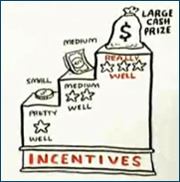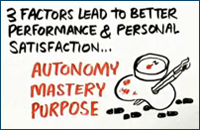A speech given by Dan Pink at the RSA and later animated by Cognitive Media was uploaded to YouTube last month, and has already received close to 400,000 views, and a storm of accolades from marketing and management  professionals around the world. No wonder why. Dan talks one of the most fascinating subjects in the world — human motivation. In his speech he points out that the so-popular carrot-and-stick method generally works for simple, straightforward tasks, but “when a task gets more complicated” and “requires some conceptual, creative thinking, those kind of motivators don’t work.” He doesn’t talk about it, but the fact is that monetary bonuses, which so many of us, managers, are using as the main motivators, stop being motivating when used repetitively, and you cannot motivate a worker by the same amount of bonus indefinitely (larger amounts start being expected, and at one point, the whole model stops making economic sense to the employer/manager).
professionals around the world. No wonder why. Dan talks one of the most fascinating subjects in the world — human motivation. In his speech he points out that the so-popular carrot-and-stick method generally works for simple, straightforward tasks, but “when a task gets more complicated” and “requires some conceptual, creative thinking, those kind of motivators don’t work.” He doesn’t talk about it, but the fact is that monetary bonuses, which so many of us, managers, are using as the main motivators, stop being motivating when used repetitively, and you cannot motivate a worker by the same amount of bonus indefinitely (larger amounts start being expected, and at one point, the whole model stops making economic sense to the employer/manager).
Dan emphasizes that with tasks that involve purely mechanical skills, monetary (read: extrinsic) motivators work well; but when the task calls for rudimentary skills, larger rewards have actually been registered to lead to poorer performance. The experiment has been replicated in hundreds of settings, and in all contexts experimenters have seen that “higher incentives led to worse performance.”
There are 3 motivators that lead to better performance and personal satisfaction. They are:
- Autonomy — the desire to be self-directed

- Mastery — the urge to get better at stuff
- Purpose — that transcendent something that really makes you race to work in the morning
Why can’t I help, but think affiliate marketing (an industry that has autonomous marketers at its very foundation!) here? All three of the above-quoted things are called intrinsic (i.e. stemming from within the individual) motivators, and they’ve been proven to create the most lasting motivation, regardless of the context.
In my opinion, this research has implications both for affiliate program managers, and for affiliates:
~ Affiliate program manages should finally understand that extrinsic motivators are NOT the only, and neither the best, way to motivate affiliates. They should look beyond the immediate monetary remuneration and, as Frederick Herzberg said, seek to “charge a person’s battery, and then recharge it, and recharge it again” (through external bonuses only), but by focusing on “intrinsic factors” which “answer people’s deep-seated need for growth and achievement” help affiliates get a generator of their own.
~ Affiliates can get good ideas from this presentation (e.g. about creating new user-driven websites in unsaturated niches).
Grab a drink, a pen and paper, and devote 10 minutes of your life to this superb presentation of “the surprising truth about what motivates us” (you won’t regret it):